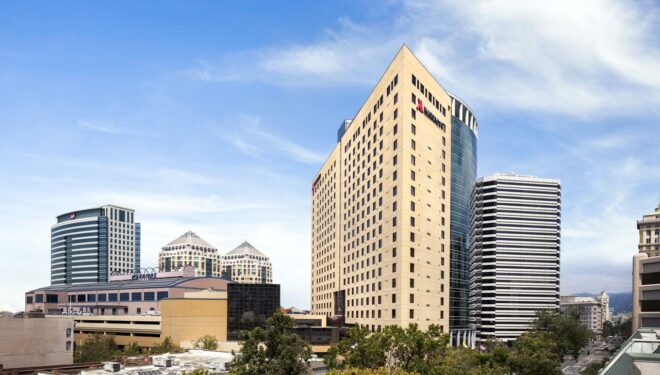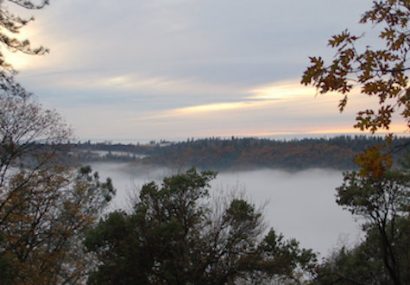
By Boyd Hill
The California Court of Appeal for the First District, in Valley Baptist Church v. City of San Rafael, held that a church is not exempt under the property taxation religious exemption of the California Constitution from a special tax to defray the cost of paramedic services that is applied to the church on a square footage basis. The Court of Appeal held that only ad valorem property taxes for general revenue purposes are exempted by that provision. [Valley Baptist Church v. City of San Rafael, ___Cal.App.5th___, Case No. A156171 (1st Dist. Feb. 26, 2021).]
Factual and Procedural Background
The City of San Rafael’s (City) Paramedic Tax was approved by voters in 1979 and initially only applied to residential properties. In 1988, the voters extended the Paramedic Tax to cover non-residential structures as well because the City’s Business License Fees and Sales Tax funds only funded police and fire services, but not paramedic services. In 2010, the voters enacted Measure 1 that raised the Paramedic Tax up to a maximum of 14 cents per foot on all non-residential structures.
In 2015-2016, the City examined its tax rolls and realized that non-residential structures subject to exemption by the county assessor had been inadvertently omitted from the Paramedic Tax. The City rectified this oversight prospectively and sought also to collect a portion of the prior unpaid Paramedic Tax.
Valley Baptist is a nonprofit religious organization that operates a church on property within the City boundaries, using its two buildings exclusively for religious worship. The City sought to collect back taxes dating back to the 2013-2014 tax year in the amount of $13,644.
Valley Baptist objected to the City’s imposition of the tax, claiming that it was exempt under the religious exemption from “property taxation” for religious buildings used exclusively for religious worship. (Cal. Const., art. XIII, § 3(f).) Valley Baptist paid the amount due under protest and sued the City for declaratory relief and damages in 2017. The lawsuit sought a declaration that the Paramedic Tax was unconstitutional as applied to Valley Baptist and that Valley Baptist was therefore exempt from payment of the special tax.
The City filed a motion for judgment on the pleadings in 2018, which the trial court denied, stating that it could not find any case addressing the issue of whether constitutional religious exemptions from property taxation applies to special taxes, thus finding no legal basis for concluding that the special tax at issue was not a form of property taxation.
Following bench trial, the trial court entered judgment for Valley Baptist, exempting it from payment of the Paramedic Tax. The trial court found that the tax was not an excise tax but instead a property tax because it was imposed on the mere ownership of property, not on the use of property. It reasoned that although the tax is clearly meant to fund a particular city service, it is imposed on owners regardless of whether they use those services or whether the structure is occupied by a tenant.
The trial court rejected the City’s argument that the religious exemption applies only to ad valorem property taxes, reasoning that a special tax assessed upon any parcel of property or person as an incident of property ownership falls within the plain meaning of “property taxation” for purposes of the article XIII exemptions.
The trial court observed that when the voters adopted Proposition 218 adding article XIIID to the California Constitution, the types of taxes were limited to either: 1) an ad valorem property tax; 2) a special tax; 3) an assessment; and 4) a fee or charge.
The City filed motions to vacate and for new trial. While the motions were pending, the City adopted an amendment to the Paramedic Tax by way of an ordinance “declaratory of existing law,” which codified the City’s process for exempting taxpayers from all or a portion of the Paramedic Tax based on low or non-occupancy of the property in questions.
The Court of Appeal’s Decision
The Court of Appeal, applying the de novo standard of review, and strictly construing exemptions from taxation beyond the plain meaning of the language, reversed the trial court’s decision. The Court of Appeal held that it was the nature of the tax as a special tax to pay for special purposes and not as an ad valorem tax to pay for general purposes, that prevented application of the “property taxation” exemption to the special Paramedic Tax, rather than the manner in which the tax was determined on the basis of property ownership.
Because the Court of Appeal could not determine whether “property taxation” under the exemption included special taxes assessed on the basis of property ownership rather than use, the Court of Appeal looked at various indicia of interpretation to reach its decision, including the history of application of tax exemptions, the exemption ballot materials, later enacted tax initiative measures, and legislative and administrative interpretation of the exemption.
The Religious Exemption
In 1974, California voters approved revisions to Article XIII of the California Constitution, which deals with the taxing powers of state and local government. Section 1 establishes the principle of uniform assessment and taxation and confirms the Legislature’s power to tax all property.
Section 3(f) exempts from “property taxation” various forms of property including buildings used exclusively for religious worship. Section 3(f) does not address whether the exemption applies to special taxes because the special tax category did not come into existence until the passage of Proposition 13 in 1978. Thus, the Court of Appeal looked at extrinsic aids to interpret whether the exemption applies to special taxes that are applied on a property basis.
Historical Application of Exemptions
The Court of Appeal reviewed the history of exemptions from property taxation in California. The first California constitution in 1849 required property taxation to be equal and uniform. Thus, the California Supreme Court initially struck down a legislative exemption for churches and other organizations in 1868. The California Constitution was amended in 1879, striking the “equal and uniform” requirement. By 1894 a series of amendments exempted certain activities and properties from taxation, including by 1944 religious property used exclusively for religious purposes.
Reviewing California Supreme Court decisions concerning the applicability of the exemptions to various forms of taxes, the Court of Appeal was able to glean four principles of interpretation of the “property taxation” exemptions: 1) the exemptions to property taxation apply only to direct property taxes and not to other forms of taxation such as an excise or use tax; 2) the only form of “property taxation” since the first state constitution was the ad valorem property tax, a general tax levied in proportion to the assessed value of property; 3) other property related exactions such as special assessments for flood control purposes have not been considered “property taxes” subject to exemptions; and (4) exemptions from property taxation must be strictly construed against the right to the tax benefit and any intent to extend the tax exemption must be conveyed in “unmistakably clear language.”
Proposition 8 Ballot Materials
The clarification of Article 13 provisions contained in the 1974 Proposition 8 did nothing to change the application of the “property taxation” religious exemption solely to ad valorem property taxes. There is nothing in Article XIII, either in the text of the article or in the ballot materials that indicates the exemption was intended to cover special property taxes.
Later Enacted Tax Initiative Measures
Since Proposition 8, voters have enacted a series of constitutional initiative measures to increase voter control over state and local authority to raise revenue.
Proposition 13 enacted in 1974 created Article XIII A which capped ad valorem real property tax rate increases and prohibited special taxes that are ad valorem taxes on real property but created a new type of non-ad valorem special property tax. Special property taxes are allowed that are a tax on mere ownership of property. Proposition 13 did not mention the property tax exemptions, but the ballot materials describe special taxes as distinct from the ad valoremproperty taxes subject to exemption.
Proposition 218 enacted by voters in 1996 created Articles XIII C and XIII D to curb abuses by local governments to raise revenue following Proposition 13. Article XIII C clarified that a special tax requiring two-third voter approval was any tax for specific purposes. Article XIII D limits the ability of local governments to impose or increase property-related taxes, assessments or fees. Thus, Proposition 218 confirmed that a special tax could be a property tax when imposed upon a parcel as an incident of property ownership.
Although Proposition 218 allows special taxes to be property taxes, it does not expressly extend the property taxation exemption to special taxes. The rule of strict construction against tax exemptions requires any intent to extend the benefits of the exemption to a new form of taxation be clearly expressed or strongly implied by the text of the provision or its legislative materials, with any doubt resolved against the insertion of the exemption. (Cedars of Lebanon Hosp. v. County of Los Angeles, et al., 35 Cal.2d 729, 734 (1950).)
Legislative and Administrative Interpretation
Contemporaneous interpretation by the California Legislature provides further support for the conclusion that the Article XIII exemptions from property taxation apply solely to ad valorem property taxes. When in 1979 the Legislature adopted Government Code § 53978 allowing for special property taxes to fund police and fire protection services, but exempting government agencies from the tax, the Legislature affirmed that pre-existing constitutional property taxation exemptions only applied to ad valorem property taxes and did not apply to special property taxes, and that an express exemption would instead be required.
Similarly, the State Board of Equalization (SBE), the California agency with most experience in interpreting tax matters, held in 1980 that the City of Palmdale was not required to exempt a church from a special property tax enacted pursuant to Government Code § 53978. The SBE opinion held that long standing precedent under the Free Exercise Clause of the U.S. Constitution, First Amendment, allowed for taxation of churches to bear their fair share of a tax that is not exacted for the privilege of exercising their religion. Implicit in the SBE opinion is the conclusion that Article CIII exemptions do not extend to special property taxes. The Legislature did not take any action to overturn that administrative decision.
Conclusion and Implications
This opinion by the First District Court of Appeal demonstrates the perhaps unintended consequence of allowing special property taxes for specific governmental purposes in the wake of lessening the burden of ad valorem taxes under the 1974 Proposition 13. Where previously churches were exempt from the main source of revenue for government functioning, with the new sources of revenue from special property taxes, even with the two-thirds barrier to enact special property taxes, more of the tax burden is being imposed through special property taxes, from which churches are not exempt. Individual churches in local communities now find themselves in a minority position to protect against taxes which may disproportionately impact them, exacerbated by their lessened level of property use and limited ability to obtain income to pay for property-based taxation. Churches may need to organize, monitor and lobby for a reduced burden of existing and future special taxes. The resulting City ordinance that was enacted on appeal in this case allowing for special tax avoidance and reduction for underutilized church structures demonstrates how effective advocacy can result in reduction of that burden. The court’s opinion is available online at: https://www.courts.ca.gov/opinions/documents/A156171.PDF




